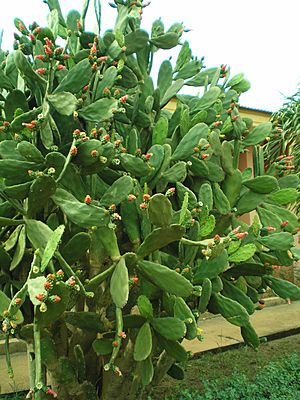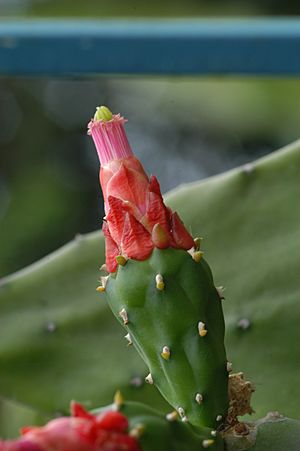Opuntia cochenillifera facts for kids
Quick facts for kids Opuntia cochenillifera |
|
|---|---|
 |
|
| Conservation status | |
| Scientific classification | |
| Genus: |
Opuntia
|
| Species: |
cochenillifera
|
| Synonyms | |
|
|
Opuntia cochenillifera is a unique kind of cactus. It is part of the Opuntioideae family, which includes many different cacti. This plant likely first grew only in Mexico. However, it has been moved and now grows in many other parts of the world. This means it is an introduced species in those new places.
About the Nopal Cactus
Opuntia cochenillifera is often called a "nopal" cactus. Like other cacti, it has thick, fleshy stems that store water. This helps it survive in dry places. Instead of leaves, it has flat, paddle-like stems called cladodes. These stems are covered in small, sharp spines.
Where It Comes From
This cactus is thought to be endemic to Mexico. This means it naturally grew only in Mexico for a long time. Over the years, people have moved it to other countries. Now, you can find it growing in many warm regions around the globe.
How It Was Named
The first time this cactus was officially described was in 1753. A famous scientist named Carl Linnaeus gave it the name Cactus cochenillifer. Later, in 1768, another botanist named Philip Miller renamed it. He gave it the name we use today: Opuntia cochenillifera.
See also
 In Spanish: Nopal chamacuero para niños
In Spanish: Nopal chamacuero para niños
 | Leon Lynch |
 | Milton P. Webster |
 | Ferdinand Smith |



